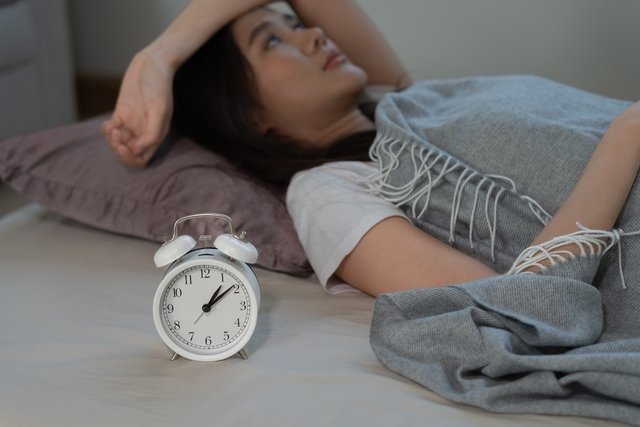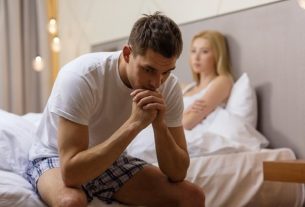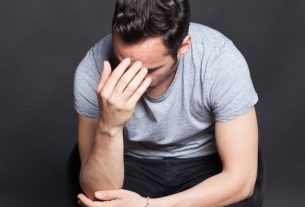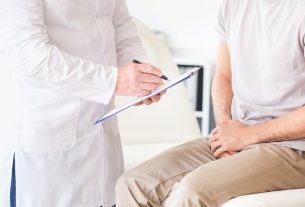Not being able to sleep can be caused by anxiety, stress, depression, sleep apnea or menopause, or by consuming too much caffeine, having a room temperature that is too cold or too hot, or using your cell phone excessively.
These conditions can lead to difficulty falling asleep or waking up during the night with little restful sleep, and result in drowsiness during the day, difficulty concentrating, headache or irritability, for example.
To get a good night’s sleep, you can drink calming tea, avoid using your cell phone or regulate the room temperature. However, when difficulty sleeping is frequent, you should consult a general practitioner, psychiatrist or neurologist, so that the cause can be identified and the most appropriate treatment can be initiated.

Main causes
The main causes of not being able to sleep are:
1. Anxiety
Anxiety is a psychological disorder that can cause difficulty falling asleep or cause a person to wake up a few times at night.
Anxiety is a normal reaction of the body to situations that cause worry or fear, however, when excessive or intense, it can indicate some conditions, such as generalized anxiety disorder (GAD) or panic syndrome.
What to do: You should create an environment conducive to relaxation, in addition to drinking tea with calming properties before bed, such as valerian or chamomile tea, for example, as they help to relax and reduce anxiety. Check out the main teas for anxiety.
Don’t ignore your symptoms!
2. Stress
Stress can also cause difficulty sleeping, and is usually caused by situations such as pressure at work, bereavement, losing a job or ending a relationship, for example. See other causes of stress.
These conditions can cause an increase in the production of cortisol, a hormone that helps the body respond to stressful situations, and which at night, in normal situations, is lower and melatonin higher to induce sleep.
What to do: It is important to organize your time better, do pleasurable activities, such as walking or practicing a hobby, for example. However, when stress is intense, you should consult a psychiatrist or general practitioner who can recommend the most appropriate treatment.
3. Depression
Depression is a psychological disorder that can cause difficulty sleeping, sleeping too few hours a night or sleeping too long.
In addition, other symptoms of depression are feeling sad, anxious or “empty”, not wanting to do activities that were previously enjoyable, or having frequent feelings of hopelessness or pessimism. Know how to identify all the symptoms of depression.
What to do: The treatment of depression must be carried out by a psychiatrist and psychotherapy may be indicated to help better deal with emotions and feelings, and in some cases the use of antidepressant medications, such as amitriptyline, fluoxetine, citalopram, venlafaxine or duloxetine, for example. See the main remedies for depression.
4. Delayed sleep phase syndrome
Delayed sleep phase syndrome is a circadian cycle disorder in which people have difficulty falling asleep and sleep later, being more common in adolescents or young adults. Understand what the circadian cycle is.
Despite falling asleep and waking up later, in most cases, people with this syndrome have normal sleep, but may experience drowsiness during the day, and reduced academic performance, for example.
What to do: Treatment should be carried out with the guidance of a general practitioner or a sleep doctor, and generally involves placing bright light at the appropriate time to wake up and taking melatonin in the evening can help readjust the biological schedule.
5. Excessive caffeine consumption
Excessive caffeine consumption can cause difficulty sleeping, because drinks containing caffeine are central nervous system stimulants, causing a state of alertness.
Furthermore, some people metabolize caffeine slowly, causing it to remain in the body longer, even when taken in smaller doses.
What to do: you should avoid drinking drinks containing caffeine for at least 6 hours before bed, and give preference to teas that promote relaxation and sleep, such as chamomile tea or lemon balm, for example. Check out the main teas for sleeping well.
6. Sleeping during the day
Sleeping during the day, especially in the late afternoon, or taking a long nap, can cause difficulty in falling asleep at night, cause the person to wake up during the night or have poor sleep quality.
What to do: Long naps should be avoided, and it is recommended to sleep for a maximum of 30 minutes during the day, preferably in the early afternoon, to avoid difficulty sleeping at night.
7. Excessive cell phone use
Excessive use of a cell phone, computer or tablet before bed can interfere with the onset of sleep, causing difficulty sleeping.
This is because these devices emit light, interfering with the production of melatonin, which is a hormone that induces sleep, released by the body in response to darkness.
In this way, with the decrease in melatonin production, the brain sends stimuli to the adrenal glands to increase the production of cortisol to make the body more alert and increase wakefulness during the day, interfering with sleep.
What to do: You should avoid using your cell phone, computer, tablet or any other electronic device for at least 30 minutes before bed to promote sleep.
8. Sleep apnea
Sleep apnea is a momentary cessation of breathing or very shallow breathing during sleep, resulting in snoring and nighttime awakenings, disrupting sleep.
Furthermore, sleep apnea can cause symptoms of drowsiness during the day, difficulty concentrating, headache and irritability, for example.
What to do: Sleep apnea should be treated by a pulmonologist or sleep doctor, who may recommend a device called CPAP or, in some cases, surgery. Learn more about treating sleep apnea.
9. Inadequate room temperature
A room temperature that is too hot or too cold can cause difficulty sleeping or cause the person to wake up several times a night.
Furthermore, wearing too much clothing when sleeping on hot days can also interfere with sleep, as can not wearing enough clothes or blankets on cold days.
What to do: Ideally, the room temperature should be between 18 and 22ºC, and you can use air conditioning in this temperature range, or even use a fan or room humidifier. On cold days, you should dress appropriately and use enough blankets, as well as winter bedding.
10. Menopause
Menopause is the moment marked by the end of a woman’s fertile age when the ovaries stop producing estrogen and, therefore, the end of menstrual cycles, and generally occurs between the ages of 45 and 51.
During this phase, women may experience insomnia or difficulty falling asleep, as well as hot flashes and night sweats, resulting in lower quality and less restful sleep, making them feel more tired or irritable during the day.
What to do: You should consult your gynecologist to further investigate the symptoms of menopause and seek forms of treatment, such as hormone replacement therapy. Find out how to take hormone replacement therapy and natural options.
11. Andropause
Andropause, also known as male menopause, is a drop in testosterone levels, usually occurring between the ages of 40 and 55.
This drop in testosterone can cause insomnia and sleep changes, as well as symptoms such as heat, irritability and decreased libido.
What to do: You should consult a urologist who should advise on the treatment that can be done with testosterone hormone replacement. However, this treatment is not recommended for men with prostate cancer. Learn more about andropause treatment.
12. Restless legs syndrome
Restless legs syndrome is the involuntary movement of the legs, which can occur shortly after going to bed or throughout the night, interfering with the ability to sleep well.
This syndrome can be caused by changes in areas of the brain responsible for controlling muscle movements, iron deficiency, kidney disease or even the use of medications. See all the causes of restless legs syndrome.
What to do: The treatment must be carried out by a neurologist or general practitioner, who may recommend sleep hygiene, physical exercise and avoiding caffeine consumption before bed. In more serious cases, medications may be indicated, such as pramipexole or cabergoline, for example, to help improve sleep quality.

Sign up for our newsletter and stay up to date with exclusive news
that can transform your routine!
Warning: Undefined array key "title" in /home/storelat/public_html/wp-content/plugins/link-whisper-premium/templates/frontend/related-posts.php on line 12
Warning: Undefined array key "title_tag" in /home/storelat/public_html/wp-content/plugins/link-whisper-premium/templates/frontend/related-posts.php on line 13



